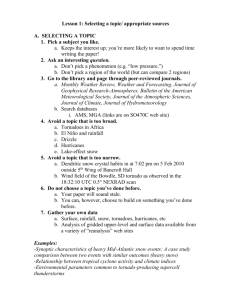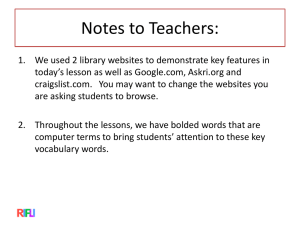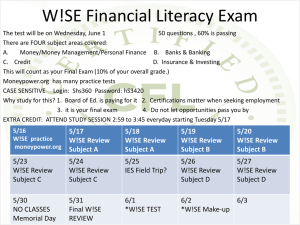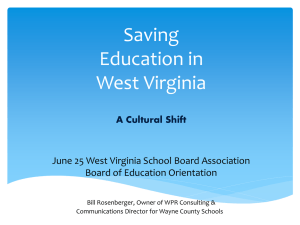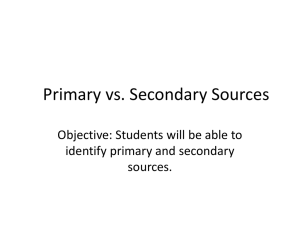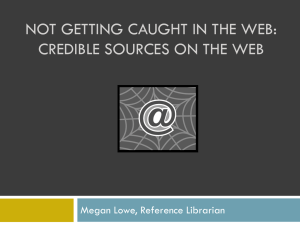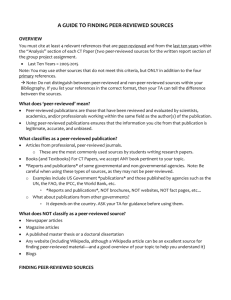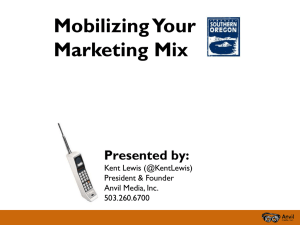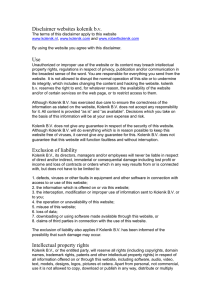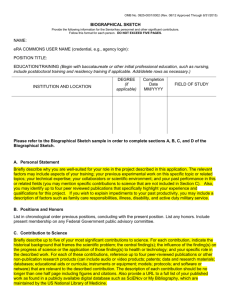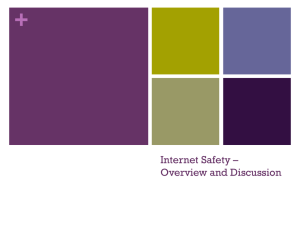Evaluating Sources - School of Social Work
advertisement
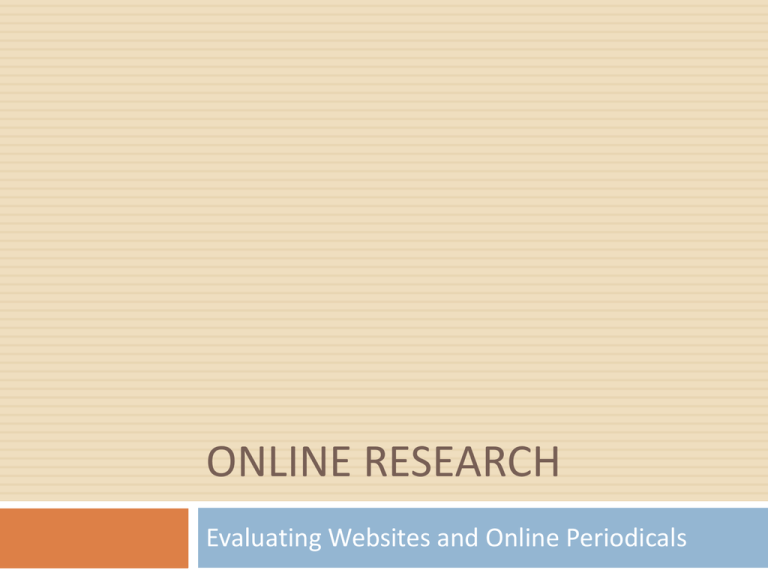
ONLINE RESEARCH Evaluating Websites and Online Periodicals Library Databases: Articles When doing research, it is preferrable to use sources from WSU’s library databases. Most of what you find by searching through the library search engines will be academic in nature and suitable for a research essay. You want to strive to use as many “peer-reviewed” sources as possible. Peer-reviewed means that the author submitted the article to an academic journal and at least three professionals reviewed the article. Example You can often find peer-reviewed articles on websites. As long as you can verify the author and journal title, these are usually safe to use. Often when you Google a topic, you will find a website that simply provides summaries or research with no author, no credentials and no publication date. Example Beyond Peer-Reviewed: Credible Newspapers, Magazines and News Websites Most major newspapers are suitable to use as sources in research essays. The New York Times, Washington Post, Wall Street Journal, CNN, The New Yorker, NPR, The Nation Local publications like the Detroit Free Press or Wayne State’s The South End are good choices as well. Problematic Sources: Wikipedia, About.com or any collectively created site Wikipedia and About.com are not bad sites to gain quick, general knowledge about an issue, but they are never acceptable as sources in an academic essay. They are not in-depth sources of information and do not have the reliability and accuracy of newspaper articles or peer-reviewed sources. Anyone can edit Wikipedia. Tip: Use the Work Cited of the Wikipedia, but never use Wikipedia as a source. Example Signs of a Quality Website Accuracy and Authority: The author’s credentials (PhD, MSW) or organization’s credentials (accredited, well-known in the field) are provided. Currency: The date of publication and last change is provided. Objectivity: The site does not have any obvious political, commercial or religious leanings. Accuracy and Authority: Electronic Articles Is the information correct? Any statistic or study needs to be cited. Even a newspaper article will give where a statistic is taken from. Does the author have the expertise to write on the topic? Anyone writing for a major state or national publication, even if not a researcher themselves, in the case of journalists, understands that arguments need to be substantiated with evidence and proof. If you use the sources from the library search engines, you do not need to even worry about this question. It is the other non-periodical or non peer-reviewed websites that need to be evaluated. When a website is not a news source or an academic site… Does the author or organization have the expertise to write on the topic? Commercial Sponsor: If a website is a .com or a .net and is not a major news source, be wary. The information provided has been reviewed by corporations not academics. Government or Educational Sponsor: If a website is a .gov or a .edu, you are usually safe to trust the studies and statistics found on these pages. Non-commercial Sponsor: .orgs can have wide ranging authors and sponsoring organizations. Consider the religious or political leanings. Personal Sponsor: Never use a personal webpage as research! A page made by an undergraduate or graduate student for a class assignment is a personal webpage. Examples of Websites with Suspect Authority and Accuracy Welfare: Who is the Author? Bad Site: http://www.welfareinfo.org/ Better Site: http://www.socialwelfarehistory.com/ *Please note that not everything on the better site is equally good. http://www.socialwelfarehistory.com/people/w-e-b-dubois/ (Bad: Has no citations and is written by an “Admin”) http://www.socialwelfarehistory.com/recollections-andopinions/ (Good: Has authors and dates) Currency: How recent is the info? This is an easy one: Do not use any source that does not include dates for statistics or the date of the site’s publication on the web. If you are using a peer-reviewed or major news periodical, make sure that the source is not more than a few years old. If you want to use an older source, make sure it is because it is an original source of theory or is often cited as the penultimate text on the subject. Any website that does not regularly update should be avoided. Examples of “Good” and “Bad” Currency Websites Good: This website contains not only recent articles, but older ones on the same page. The dates help you decipher which articles you can use. http://www.globalissues.org/issue/2/causes-of-poverty Bad: No dates and is a general encyclopedic entry http://www.socialwelfarehistory.com/people/w-eb-dubois/ Objectivity: Websites not affiliated with an academic journal or major news source No source is without bias, but you want to avoid sources that are blatantly pushing an agenda. This is sometimes hard because you may really agree with the source but it is best to find that opinion in an academic article or a news source. Look for bias in .orgs, .coms, .nets and personal webpages. Example: Even sources backed up with research, on these types of sites, will not be considered quality sources by your professor. Examples of Websites with Bias Organizations that advocate stances on controversial topics like abortion, gun rights, social security, and even child poverty and welfare, will also use statistics selectively, depending on their stance on the issue. You may passionately agree with the stance but avoid using these .orgs and .coms. It is much safer to get information about these issues from academic journals or major news sources. Government websites often have quality research on these topics as well. Food Tax: What is the Agenda of the Group? Http://www.nofoodtaxes.com/ http://www.nofoodtaxes.com/facts/#education http://www.sourcewatch.org/index.php?title=Americans_Against_Food_Taxes “Its Web site states that Americans Against Food Taxes is a "coalition of concerned citizens – responsible individuals, financially strapped families, small and large businesses in communities across the country" who opposed a government-proposed tax on food and beverages, including soda, juice drinks, and flavored milks. But its extensive membership consists mainly of lobbying groups for packaged food and soda companies, chain restaurant corporations and the world's large food and soft drink manufacturers and distributors, including the Coca-Cola Company, Dr. PepperRoyal Crown Bottling Co., PepsiCo, Canada Dry Bottling Co. of New York, the Can Manufacturers Institute, 7-Eleven Convenience Stores, and Yum! Brands.” Questions to Evaluate Sites Does the website or online article use citations for sources? No Yes Does the author or organization have the credentials and expertise to be experts? No Yes Does the sponsoring organization (Bad, Lipitor or Good, APA) have an ulterior motive for providing the information? No Yes Can anyone edit the information at anytime? No Yes Basic Library Search http://www.lib.wayne.edu/ Two ways to search (of many): 1) You can select “Social Work” in Subject Matter from “Article Databases”. Click “MetaSearch” 2) You also could do a general whole catalogue search with a keyword, title or author search. If you know the journal title or periodical title that you would like to search, you can do that through the catalogue. What issues have you had with finding sources? Tutor Contact Info Jessamon Jones Writing Tutor 313-577-8969 az3079@wayne.edu Thompson Home Room 007 Spring/Summer Hours: Tuesday/Thursday 9:30-5 Vanessa Gualtieri Writing Tutor (313)577-4409 ac8153@wayne.edu http://www.twitter.com/writewisesw Thompson Home Room 011 Spring/Summer Hours: Monday - 10:00 a.m.-5:00 p.m., Tuesday - 10:00 a.m. 3:00 p.m., Wednesday - 11:00 a.m. - 5:00 p.m., and Thursday - 10:00 a.m. 5:00 p.m.
